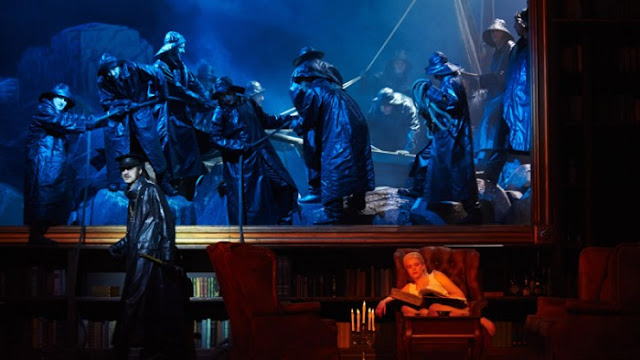It is so extraordinarily pleasant to go to a Berlin opera
premiere where the curtain falls to the sounds of thorough and unalloyed
audience pleasure and approval. Applause for the artists, cheers for the star,
applause for the musicians and conductor (Daniel Harding), and – wait for it –
cheers for the production team, director, designers, re-stager and so forth.
I’m not talking about an insane over-the-top reaction, just an audience – a first-night
audience – showing their total pleasure in, and thanks for, a fine night’s
entertainment
And where did this unusual event take place? At the Berlin
Staatsoper. And the occasion? Their new production of the Basel Theatre’s Der fliegende Holländer.
The root of the production’s success lies in its design
(Philipp Stölzl, Conrad Moritz Reinhardt), which is neatly aligned with the now
almost usual idea of approaching the show through its heroine, and her
neuroses, rather than through the titular Dutchman.
The stage pictures which form the centrepiece of the action are gloriously done – nineteenth century paintings realised in a sort of 3-D -- glowing with light and humming with activity. This is the Dutchman’s ‘world’, this picture on the wall of the prosaic Daland’s library (100s of books and dozens of maids) where the plain spinsterish Senta sits and dreams her life away, as if in a parallel world.
The concept was splendidly worked out, designed and staged
(Stölzl, Mara Kurotschka), in spite of the problems that the novice librettist,
Mr Wagner, sets anyone staging this opera (eg the embarrassing wedding feast
choruses), problems which unfortunately can’t be avoided. Still, tonight the
chorus – particularly the girls – sang much better than they did in Freischütz. Now they have to learn to
stand still, and not ‘act’.
The on-stage star of the evening was, rightfully, the
Dutchman (Michael Volle). He seems born for this part, singing it and acting it
with a rich and powerful bass-baritone, and showing all the magnetism which
sends the unstable and imaginative Senta round the bend. Senta (Emma Vetter)
took a while to gather steam, but was going strong by the last act.
There was a particularly fine Erik from Stephen Rügamer,
ringing and passionate, and a competent Daland – what else can you do with this
non-part except be ‘competent’ – from Tobias Schabel. The Steersman (Peter
Sonn) has a nice voice, but also a wobble.
Just one casting query. When so much trouble has been taken
over the visuals of the show, why cast Daland with a man who looks like Erik’s
contemporary, and Senta’s son. I know it shouldn’t matter, but it spoils the
story’s credibility.
And one design query. Please can we throw out those awful
Gretchen wigs – the peroxide blonde, stringy ones – which invade German opera.
Senta’s, especially over the gaping back of her wedding dress, made her look like a
comical kewpie doll.
But the queries and quibbles were few to non-existent
tonight. When I scurried for my train, after the third curtain call people were
still clapping furiously.
Wouldn’t it be nice if that happened all the time.






No comments:
Post a Comment